| Listing 1 - 10 of 10 |
Sort by
|

ISBN: 0521466474 0521460980 0511552742 9780511552748 9780521460989 9780521466479 Year: 1994 Volume: 11 Publisher: Cambridge [England] New York Cambridge University Pres
Abstract | Keywords | Export | Availability | Bookmark
 Loading...
Loading...Choose an application
- Reference Manager
- EndNote
- RefWorks (Direct export to RefWorks)
The language theory of Mikhail Bakhtin does not fall neatly under any single rubric - 'dialogism,' 'marxism,' 'prosaics,' 'authorship' - because the philosophic foundation of his writing rests ambivalently between phenomenology and Marxism. The theoretical tension of these positions creates philosophical impasses in Bakhtin's work, which have been neglected or ignored partly because these impasses are themselves mirrored by the problems of antifoundationalist and materialist tendencies in literary scholarship. In Mikhail Bakhtin: Between Phenomenology and Marxism Michael Bernard-Donals examines various incarnations of phenomenological and materialist theory - including the work of Jauss, Fish, Rorty, Althusser, and Pecheux - and places them beside Bakhtin's work, providing a contextualised study of Bakhtin, a critique of the problems of contemporary critics, and an original contribution to literary theory.
Bakhtin, Michael M. --- Communism and linguistics --- Communisme en taalwetenschap --- Communisme et linguistique --- Fenomenologie --- Linguistics and communism --- Linguistique et communisme --- Phenomenology --- Phénoménologie --- Taalwetenschap en communisme --- Communism and linguistics. --- Language and languages --- Literature --- Phenomenology. --- Philosophy. --- History and criticism --- Theory, etc. --- 82:1 --- Literatuur en filosofie --- 82:1 Literatuur en filosofie --- Philosophy, Modern --- Belles-lettres --- Western literature (Western countries) --- World literature --- Philology --- Authors --- Authorship --- Linguistics --- Philosophy --- History and criticism&delete& --- Theory, etc --- Bakhtin, M. M. --- Bachtin, Michail, --- Bachtin, Michail M., --- Baxtin, Mixail Mixailovič, --- Bakhtine, Mikhaïl, --- Bajtin, Mijail, --- Bakhtin, Mikhail Mikhaĭlovich --- Bakhtin, Mikhail Mikhaĭlovich, --- Bahŭchʻin, --- Bahtyin, M. M. --- Bahtyin, Mihail Mihajlovics, --- Bahtin, M. M., --- Bachtinas, M. --- Bachtinas, Michailas, --- Бахтин, М. М. --- Bahtin, Mihail, --- Bakhtin, Mikhail, --- Бахтин, Михаил Михайлович, --- Bakhtin, Mikhail Mikhaïlovich --- Bakhtin, M. M. - (Mikhail Mikhaæilovich), - 1895-1975. --- Arts and Humanities --- Literature History and criticism --- Bakhtin, Mikhayil, --- PHENOMENOLOGIE --- BAKHTINE (MIKHAIL), 1895-1975 --- LITTERATURE --- LANGAGE ET LANGUES --- COMMUNISME ET LINGUISTIQUE --- HISTOIRE ET CRITIQUE --- THEORIE --- PHILOSOPHIE --- Philosophie du langage
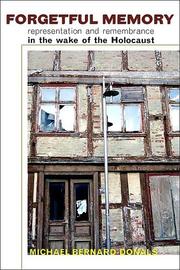
ISBN: 0791477185 1441603662 9781441603661 9780791477182 0791476715 9780791476710 9780791476727 Year: 2009 Publisher: Albany State University of New York Press
Abstract | Keywords | Export | Availability | Bookmark
 Loading...
Loading...Choose an application
- Reference Manager
- EndNote
- RefWorks (Direct export to RefWorks)
Much of the discussion surrounding the Holocaust and how it can be depicted sixty years later has focused on memory. In Forgetful Memory, Michael Bernard-Donals focuses on the relation between memory and forgetfulness, arguing that memory and forgetfulness cannot be separated but must be examined as they complicate our understanding of the Shoah. Drawing on the work of Josef Yerushalmi, Maurice Blanchot, David Roskies, and especially Emmanuel Levinas, Bernard-Donals explores contemporary representations of the Holocaust in memoirs, novels, and poetry; films and photographs; in museums; and in our contemporary political discourse concerning the Middle East. Ultimately, Forgetful Memory makes the case that we should give up on the idea of memory as a kind of representation, and that we should see it instead as an intersection of remembrance and oblivion, as a kind of writing, where what remains at its margins—what is left unwritten—is at least as important as what is given voice.
Holocaust, Jewish (1939-1945) --- Memory --- Retention (Psychology) --- Intellect --- Psychology --- Thought and thinking --- Comprehension --- Executive functions (Neuropsychology) --- Mnemonics --- Perseveration (Psychology) --- Reproduction (Psychology) --- Historiography. --- Influence. --- Moral and ethical aspects. --- Social aspects.
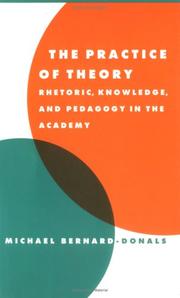
ISBN: 9780511004664 0511585144 0511004664 9780511004667 0521594332 0521595061 9780511585142 9780521594332 9780521595063 Year: 1998 Volume: 26 Publisher: Cambridge : Cambridge University Press,
Abstract | Keywords | Export | Availability | Bookmark
 Loading...
Loading...Choose an application
- Reference Manager
- EndNote
- RefWorks (Direct export to RefWorks)
Though theory has become a common language in the humanities in recent years, the relation between theoretical speculation and its practical application has yet to be fully addressed. In The Practice of Theory, Michael Bernard-Donals examines the connection between theory and pedagogy at the level of practice. He asks how such a practice works not only to change the way we read and speak with one another, but also the conditions in which these activities become possible. Bernard-Donals argues that the most sophisticated practice linking pedagogy to theory is rhetoric, but the version of this tradition in thinkers like Rorty and Fish is never broad enough. The conception of rhetoric he proposes instead is linked to other human and natural sciences. The practice of theory investigates the degree to which a materialistic rhetoric can reinvigorate the link between theory, teaching and practice, and offers a sustained reflection on the production of knowledge across a broad range of contemporary disciplines.
Rhetoric. --- Knowledge, Theory of. --- Language and education. --- Language and languages --- Speaking --- Authorship --- Expression --- Literary style --- Educational linguistics --- Education --- Epistemology --- Theory of knowledge --- Philosophy --- Psychology --- Rhetoric --- Arts and Humanities --- Literature
Book
ISBN: 1438460783 9781438460789 9781438460772 1438460775 Year: 2016 Publisher: Albany
Abstract | Keywords | Export | Availability | Bookmark
 Loading...
Loading...Choose an application
- Reference Manager
- EndNote
- RefWorks (Direct export to RefWorks)
"Explores how the USHMM and other museums and memorials both displace and disturb the memories that they are trying to commemorate. Figures of Memory examines how the United States Holocaust Memorial Museum (USHMM) in Washington, DC, uses its space and the design of its exhibits to 'move' its visitors to memory. From the objects and their placement to the architectural design of the building and the floor plan, the USHMM was meant to teach visitors about the Holocaust. But what Michael Bernard-Donals found is that while they learn, and remember, the Holocaust, visitors also call to mind other, sometimes unrelated memories. Partly this is because memory itself works in multidirectional ways, but partly it's because of decisions made in the planning that led to the creation of the museum. Drawing on material from the USHMM's institutional archive, including meeting minutes, architectural renderings, visitor surveys, and comments left by visitors, Figures of Memory is both a theoretical exploration of memory--its relation to identity, space, and ethics--and a practical analysis of one of the most discussed memorials in the United States. The book also extends recent discussions of the rhetoric of memorial sites and museums by arguing that sites like the USHMM don't so much 'make a case for' events through the act of memorialization, but actually displace memory, disturbing it--and the museum visitor--so much so that they call it into question. Memory, like rhetorical figures, moves, and the USHMM moves its visitors, figuratively and literally, both to and beyond the events the museum is meant to commemorate"--From publisher's website.
Museums --- Museum exhibits --- Museum visitors --- Rhetoric and psychology. --- Displacement (Psychology) --- Memorials --- Memory --- Public institutions --- Cabinets of curiosities --- Display techniques --- Displays, Museum --- Museum displays --- Exhibitions --- Museum techniques --- Visitors to museums --- Persons --- Museum attendance --- Psychology and rhetoric --- Rhetoric --- Literature --- Psychology --- Displacement behavior in humans --- Defense mechanisms (Psychology) --- Human behavior --- Psychology, Pathological --- Sublimation (Psychology) --- Commemorations --- Historic sites --- Memorialization --- Monuments --- Psychological aspects. --- Social aspects. --- Psychology. --- Social aspects --- Visitors --- Psychological aspects --- United States Holocaust Memorial Museum. --- U.S. Holocaust Memorial Museum --- US Holocaust Memorial Museum --- Holocaust Museum (United States) --- USHMM --- Мемориальный музей Холокоста США --- Memorialʹnyĭ muzeĭ Kholokosta SShA
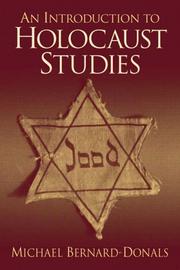
ISBN: 0131839179 Year: 2006 Publisher: Upper Saddle River (N.J.) : Pearson education,
Abstract | Keywords | Export | Availability | Bookmark
 Loading...
Loading...Choose an application
- Reference Manager
- EndNote
- RefWorks (Direct export to RefWorks)
Holocaust, Jewish (1939-1945) --- Holocaust, Jewish (1939-1945), in literature. --- Memory. --- Historiography.
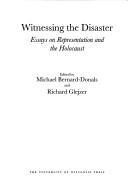
ISBN: 1282269143 9786612269141 0299183637 9780299183639 9780299183608 0299183602 9780299183646 0299183645 0299183602 0299183645 9781282269149 6612269146 Year: 2003 Publisher: Madison University of Wisconsin Press
Abstract | Keywords | Export | Availability | Bookmark
 Loading...
Loading...Choose an application
- Reference Manager
- EndNote
- RefWorks (Direct export to RefWorks)
Holocaust, Jewish (1939-1945), in literature -- Study and teaching. --- Judaism and literature -- Study and teaching. --- Holocaust, Jewish (1939-1945), in literature --- Judaism and literature --- Literature - General --- Languages & Literatures --- Literature and Judaism --- Literature --- Study and teaching --- Study and teaching.
Book
ISBN: 9781611686418 1611686415 9781611686395 1611686393 9781611686401 1611686407 Year: 2014 Publisher: Waltham, Massachusetts
Abstract | Keywords | Export | Availability | Bookmark
 Loading...
Loading...Choose an application
- Reference Manager
- EndNote
- RefWorks (Direct export to RefWorks)
Addresses the plurality of Jewish approaches to rhetoric and traditions from ancient times to the present day
Jews --- Jewish literature --- Yiddish literature --- Hebrew literature --- Yiddish language --- Hebrew language --- Identity, Jewish --- Jewish identity --- Jewishness --- Jewish law --- Jewish nationalism --- German Hebrew --- Hebreo-German language --- Jewish language --- Jiddisch language --- Judaeo-German language (Yiddish) --- Judeo-German language (Yiddish) --- Identity. --- History and criticism. --- Rhetoric. --- Ethnic identity --- Race identity --- Legal status, laws, etc. --- Languages
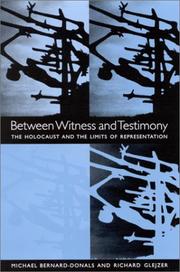
ISBN: 079145150X Year: 2001 Publisher: Albany (N.Y.) : State university of New York press,
Abstract | Keywords | Export | Availability | Bookmark
 Loading...
Loading...Choose an application
- Reference Manager
- EndNote
- RefWorks (Direct export to RefWorks)
Book
ISBN: 0271089733 0271089571 Year: 2021 Publisher: University Park, Pennsylvania : The Pennsylvania State University Press,
Abstract | Keywords | Export | Availability | Bookmark
 Loading...
Loading...Choose an application
- Reference Manager
- EndNote
- RefWorks (Direct export to RefWorks)
With language we name and define all things, and by studying our use of language, rhetoricians can provide an account of these things and thus of our lived experience. The concept of the sacred, however, raises the prospect of the existence of phenomena that transcend the human and physical and cannot be expressed fully by language. The sacred thus reveals limitations to rhetoric.Featuring essays by some of the foremost scholars of rhetoric working today, this wide-ranging collection of theoretical and methodological studies takes seriously the possibility of the sacred and the challenge it poses to rhetorical inquiry. The contributors engage with religious rhetorics—Jewish, Jesuit, Buddhist, pagan—as well as rationalist, scientific, and postmodern rhetorics, studying, for example, divination in the Platonic tradition, Thomas Hobbes’s and Walter Benjamin’s accounts of sacred texts, the uncanny algorithms of Big Data, and Hélène Cixous’s sacred passages and passwords. From these studies, new definitions of the sacred emerge—along with new rhetorical practices for engaging with the sacred.This book provides insight into the relation of rhetoric and the sacred, showing the capacity of rhetoric to study the ineffable but also shedding light on the boundaries between them.

ISBN: 0791451496 0791489671 Year: 2001 Publisher: State University of New York Press
Abstract | Keywords | Export | Availability | Bookmark
 Loading...
Loading...Choose an application
- Reference Manager
- EndNote
- RefWorks (Direct export to RefWorks)
| Listing 1 - 10 of 10 |
Sort by
|

 Search
Search Feedback
Feedback About UniCat
About UniCat  Help
Help News
News